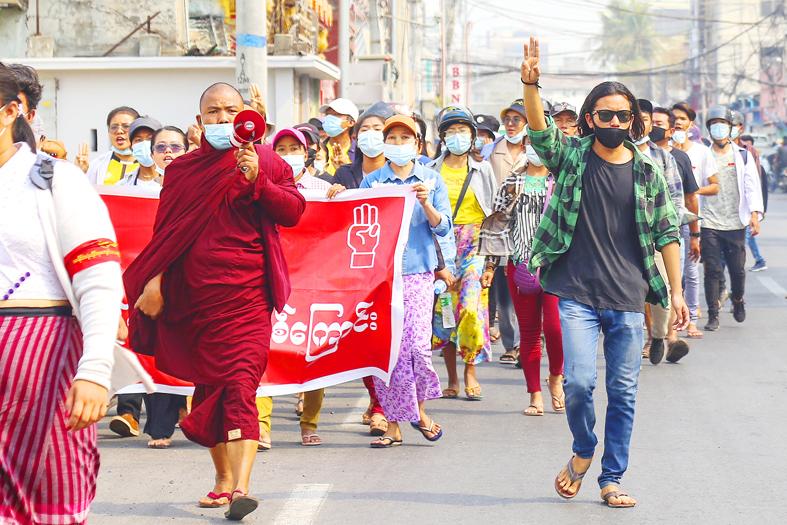Footwear maker Pou Chen Corp (寶成工業) yesterday said that it has suspended production at its plant in Myanmar amid clashes between police and protesters following a military coup on Feb. 1, in which the military deposed civilian leader Aung San Suu Kyi.
Pou Chen provides original design manufacturing services to international brands, such as Nike Inc, Adidas AG, Asics Corp, New Balance Athletic Shoe Inc, Timberland Co and Salomon SAS.
The company said that the decision to stop production was made out of safety considerations.

Photo: EPA-EFE/STR
The suspension is not expected to have an adverse effect on Pou Chen’s overall operations, as the Burmese plant accounts for a fraction of its total production, the company said.
Its factories in Bangladesh, Cambodia and Myanmar account for about 4 percent of the firm’s total production, Pou Chen said, adding that the closure of the Burmese manufacturing facility would not cause any delays in shipments to customers.
If greater capacity is needed to meet demand, production would be increased at its plants in Indonesia and Vietnam to fill the void left by the Burmese plant, the company said.
Pou Chen’s business has been affected by the COVID-19 pandemic, with revenue from its shoe contracting business falling 24.6 percent last year from a year earlier.
Tsang Yi Co (昌億), another Taiwanese footwear maker that supplies shoes to Adidas, has also halted its production in Myanmar amid the violence there, the Ministry of Economic Affairs’ Invest Taiwan office said.
Pou Chen and Tsang Yi suspended their Burmese operations to protect their employees, and it is unclear when production would resume given the turmoil in the country, the office said.

Nvidia Corp chief executive officer Jensen Huang (黃仁勳) on Monday introduced the company’s latest supercomputer platform, featuring six new chips made by Taiwan Semiconductor Manufacturing Co (TSMC, 台積電), saying that it is now “in full production.” “If Vera Rubin is going to be in time for this year, it must be in production by now, and so, today I can tell you that Vera Rubin is in full production,” Huang said during his keynote speech at CES in Las Vegas. The rollout of six concurrent chips for Vera Rubin — the company’s next-generation artificial intelligence (AI) computing platform — marks a strategic

REVENUE PERFORMANCE: Cloud and network products, and electronic components saw strong increases, while smart consumer electronics and computing products fell Hon Hai Precision Industry Co (鴻海精密) yesterday posted 26.51 percent quarterly growth in revenue for last quarter to NT$2.6 trillion (US$82.44 billion), the strongest on record for the period and above expectations, but the company forecast a slight revenue dip this quarter due to seasonal factors. On an annual basis, revenue last quarter grew 22.07 percent, the company said. Analysts on average estimated about NT$2.4 trillion increase. Hon Hai, which assembles servers for Nvidia Corp and iPhones for Apple Inc, is expanding its capacity in the US, adding artificial intelligence (AI) server production in Wisconsin and Texas, where it operates established campuses. This

US President Donald Trump on Friday blocked US photonics firm HieFo Corp’s US$3 million acquisition of assets in New Jersey-based aerospace and defense specialist Emcore Corp, citing national security and China-related concerns. In an order released by the White House, Trump said HieFo was “controlled by a citizen of the People’s Republic of China” and that its 2024 acquisition of Emcore’s businesses led the US president to believe that it might “take action that threatens to impair the national security of the United States.” The order did not name the person or detail Trump’s concerns. “The Transaction is hereby prohibited,”

Garment maker Makalot Industrial Co (聚陽) yesterday reported lower-than-expected fourth-quarter revenue of NT$7.93 billion (US$251.44 million), down 9.48 percent from NT$8.76 billion a year earlier. On a quarterly basis, revenue fell 10.83 percent from NT$8.89 billion, company data showed. The figure was also lower than market expectations of NT$8.05 billion, according to data compiled by Yuanta Securities Investment and Consulting Co (元大投顧), which had projected NT$8.22 billion. Makalot’s revenue this quarter would likely increase by a mid-teens percentage as the industry is entering its high season, Yuanta said. Overall, Makalot’s revenue last year totaled NT$34.43 billion, down 3.08 percent from its record NT$35.52